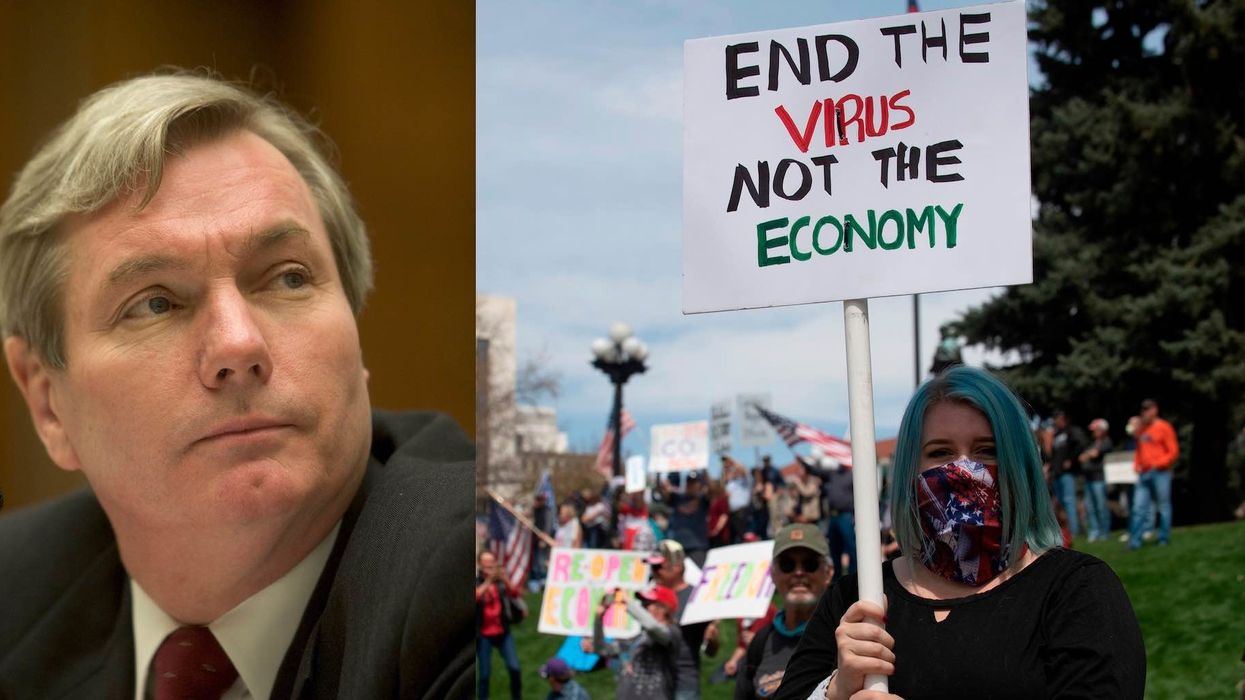
Photo (left) by Brendan Smialowski/Bloomberg via Getty Images; Photo (right) by JASON CONNOLLY/AFP via Getty Images

Mixed messages
One of the top advisers on former Vice President Joe Biden's coronavirus task force on Wednesday advocated a four- to six-week lockdown, claiming such a shutdown could get rising COVID-19 numbers under control and that government could pay all the wages lost during the time.
But that adviser was singing a very different tune last spring when he advocated against a national shutdown.
Dr. Michael Osterholm, who sits on Biden's task force and serves as director of the Center of Infectious Disease Research and Policy at the University of Minnesota, told Yahoo! Finance that a month-and-a-half lockdown could be just the move America needs to fight COVID-19.
"We could pay for a package right now to cover all of the wages, lost wages for individual workers for losses to small companies to medium-sized companies, for city, states, county governments," he said. "We could do all of that, and if we did that, then we could lockdown for four to six weeks.
"And if we did that, we could drive the numbers down, like they've done in Asia, like they did in New Zealand and Australia," he added, "and then we could really watch ourselves cruising into vaccine availability in the first and second quarter of next year and bringing back the economy long before that."
One of Biden's new coronavirus task force doctors floating the idea of a 4-6 week lockdown: “We could pay for a pa… https://t.co/OsmdZ6MNIH— Zack Guzman (@Zack Guzman) 1605119078.0
But in March, Osterholm wrote an op-ed for the Washington Post headlined, "Facing covid-19 reality: A national lockdown is no cure." In it, the doctor warned against a "national shutdown directive," which he described as "ringing a giant bell that we don't know how to un-ring."
Sounding a lot like President Donald Trump, Osterholm began his piece saying the world would see a vaccine or see the virus "burn itself out" and noting that our economy would not survive a bunch of "short-term action plans."
Covid-19 will go away eventually in one of two ways. Either we will develop a vaccine to prevent it, or the virus will burn itself out as the spread of infection comes to confer a form of herd immunity on the population. Neither of those possibilities will occur quickly.
It is time to face reality. We urgently need a unified national strategy, one informed by the best science about stopping diseases like covid-19 and from virus control efforts in China, Singapore and Hong Kong, as well as realistic projections of the human and economic toll of any option we pursue. Our way of life cannot survive an indefinite series of short-term action plans.
We have to ask what we hope to accomplish with limited self-quarantines and shelter-in-place directives.
He went on to ask a couple of important questions many advocates of lockdowns often don't appear to ask: "What happens after a several-week moratorium on normal activity? Does the president, governor or mayor declare another?"
The doctor noted that Italy imposed a "near-draconian" lockdown in an attempt halt the spread of the coronavirus without anyone having any real idea whether it would work long term.
Appearing today to have been prescient, considering Italy's massive second (and enduring) wave of COVID-19 cases, Osterholm asked: After Italy returns to normal life, "will there be a major second wave of cases? If that happens, should they simply 'rinse and repeat'?"
And then he offered his warning to those advocating for shutting down businesses, schools, and life in general. He began:
As a country, with momentum building for a possible national shutdown directive, we are on the verge of ringing a giant bell that we don't know how to un-ring.
Yet we don't, for example, have good data on the real impact of closing public and private K-12 schools on the spread of covid-19. Hong Kong and Singapore, advanced city-states that experienced the outbreak early, both attempted to respond quickly and efficiently. Hong Kong closed schools; Singapore did not, and there was hardly any difference in the rate of transmission. The second-order effect of shutting schools is that hardest hit will be those least able to afford to miss work to care for homebound children. And what of our health professionals with children? Add to that firefighters, police officers, utility workers, delivery drivers and other essential personnel, and the magnitude of the problem is clear.
Noting a study from the Imperial College of London, the doctor pointed out that the only option for "significantly reducing the number of serious illnesses and deaths" would be a dangerous, near-total lockdown for 18 months.
Such a move, he added, would put the U.S. in more than a depression — it would result in "a complete economic breakdown."
So, what's the best option, according to the Osterholm of last spring?
Answer:
But the best alternative will probably entail letting those at low risk for serious disease continue to work, keep business and manufacturing operating, and “run" society, while at the same time advising higher-risk individuals to protect themselves through physical distancing and ramping up our health-care capacity as aggressively as possible. With this battle plan, we could gradually build up immunity without destroying the financial structure on which our lives are based.
Osterholm, who this week offered a short-term attempt to slow down COVID-19 cases, concluded his op-ed by noting that repeated, short-term attempts to "stretch out cases" in order to keep the curve flat are "unworkable."
(H/T: Steve Deace)